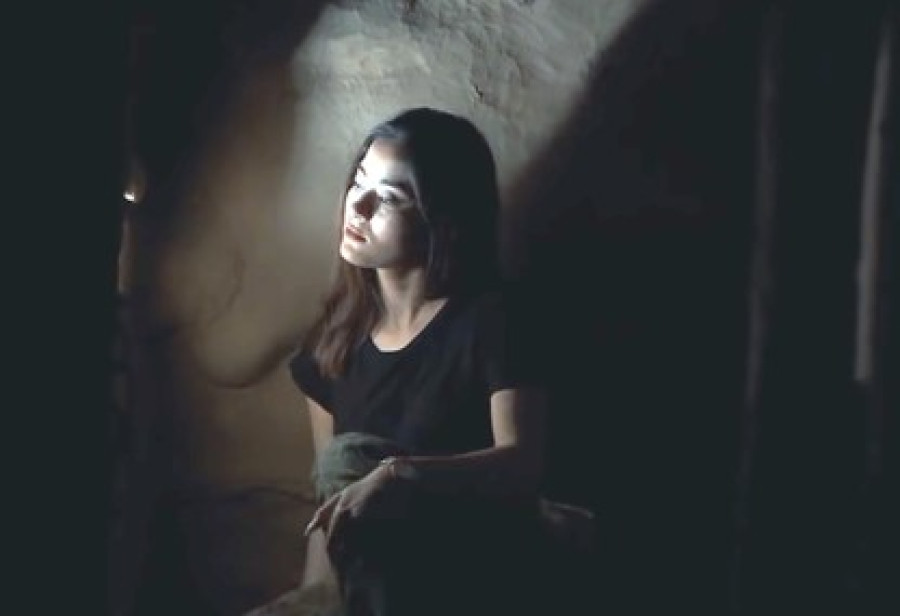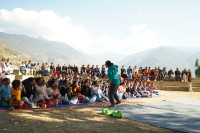Culture & Lifestyle
‘Discontinuing chhaupadi isn't just about destroying period huts; it's about ending the stigma of menstruation.’
Former Miss Nepal Shrinkhala Khatiwada discusses her one-night stay at a chhau goth in Babala, Achham, to experience the ancient practice of the outlawed Chhaupadi.
Srizu Bajracharya
In May, Miss Nepal 2018 Shrinkhala Khatiwada travelled to Babala, Achham, as part of the Social Campaign for Social Change project that attempts to understand the existing practice and scenario of chhaupadi in the remote areas of Nepal. In order to closely understand chhaupadi, Khatiwada spent hours in a chhau goth, an outdoor shed where women in remote areas, especially in far-western regions, are banished to live in isolation during their monthly menstruation cycle. In her recent YouTube documentary that has been viewed more than 600,000 times, Khatiwada compares the tradition with the modern-day nachhune barne, a practice that prohibits menstruating women from engaging in religious and kitchen activities in the cities. In this interview with the Post's Srizu Bajracharya, Khatiwada discusses her chhau goth experience in Babala and why despite all the campaigns to eradicate the practice, and the presence of laws criminalising it, chhaupadi still exists.
How did you come to know about this project?
I had received an email from the project’s members a few months ago to support their campaign. They had proposed that I spend a night in a shed to talk about the experience of women who practice chhaupadi. The idea of the campaign was to understand the practice so that it can contribute in eliminating it.
But how did the people in the village perceive this idea; did they openly talk about the practice?
Chhaupadi has been covered in the news and television so many times that people in the region now understand that the practice is viewed as inhumane. And so when we would try to talk to people about it, they would at once deny having chhau goths and pull away from conversations. It was very difficult for the team to find the actual practising chhau goths in the village. But luckily a man with whom we were working with showed us the chhau goth they used in his home, and that's where I spent my evening. Babala is a very remote village. The roadway to the place is hazardous; the wheels of the vehicle I travelled in had worn out when we got there. So you can imagine how the place is. It would have been more difficult if it had rained.
Did you spend a whole night in the chhau goth?
No, I didn't actually spend the whole night in the chhau goth. I spent roughly about six hours in the shed as my team was not ready to let me go through the whole night in the small cramped room. So what we did was, I went inside the goth during twilight and came out after midnight.
There were literally no windows, the only air passing into the room was that from the small door. If I had gone there during winter or monsoon, things would have been much more difficult. I don't have claustrophobia, but the room was so cramped that I was feeling claustrophobic.
But I still had a lot of privileges than the women who practice Chhaupadi. I was allowed to take tuki batti (lantern), but people don't have that choice either. Even the dry straws were a VIP sitting for me. Women sleep on the bare ground during their menstruation as the straws they use are considered impure and they are meant for the animals and are taken as a waste when they use it. And although I had all the facilities and everything was favourable, I still felt like an animal inside the small room.
I wasn't scared of my safety because of my team, but the feeling of being in the room was quite devastating. And this was just about some hours, but for these women, it is a lifestyle that they had already accepted, much like our nachhune barne. I understand that these two practices are different, but for their level of education, Chhaupadi is as normal as nachhune barne is for the ones who follow it. I am sure someone who has never experienced nachhune barne will see us the same way as we perceive Chhaupadi.
But why do you think the ancient tradition still continues, despite the awareness campaign and its abolishment in law?
In a way, I could understand why the tradition still continues to this day. It is much like how we still follow nachhune barne, because we fear we might infuriate gods because periods are considered impure. And for the people there, chhaupadi is an ancient tradition that they must continue. But more than men, I felt like it is the women who have been more persistent about following this culture.
And one of the reasons why they have been practicing it is because they feel impure. And it is natural for them to feel that way because of their lack of menstrual hygiene. They don't have access to sanitary pads, and the ones they get in subsidy is not enough. Also, they don't have proper undergarments, so they use pieces of cloth. But you have to understand the sentiment: who doesn't feel unclean when they are bleeding down their legs. And so these women don't want to cook when they can feel blood streaming down their legs.
Although today, this tradition has cost the lives of many, I think it started with this very experience of women feeling unclean, and of allowing women to rest during their menstrual cycle. However, the remains of the ancient practice today feel distressing as it elevates the stigma of menstrual cycle, but people have accepted this reality and they don't like it when people tell them their tradition is wrong.
But with the various campaigns happening, isn't there even a trace of gradual change happening in the place?
Definitely, things have become better than how it used to be. Many women-led campaigns are happening like the Chhau Ghar Mukta Abhiyaan. Many families have now shifted their chhau goths inside their homes, into a separate room or an independent floor where women can now sleep on beds. And many women want to discontinue the practice for their daughters, they don’t want them to experience chhaupadi as they have.
But with the small awareness efforts that have been happening across the country, what we can hope for is that the generation after us will not continue it. There is no point fighting with people who have believed in this culture for more than fifty years because that is not going to eradicate this practice and they will not understand why it is wrong.
But I also understand the change that has happened in recent times hasn't really eliminated the idea of impurity. Discontinuing chhaupadi isn't just about destroying chhau goths, it's about ending the stigma of menstruation, and for that it's important that we keep taking initiatives to aware people about menstruation hygiene.
But what is the relevance of the initiatives or even documentaries like these if it's not going to directly help eliminate the practice in the near future?
I am fully aware that my documentary is not going to be watched by people of Babala, Achham. They don't have that kind of access. And just as the many news stories that have been covered in the media, this documentary too shall be just another attempt that won't help much. But it will spark conversations. Even if we cannot change the mindset of everyone, we can try and change some people. We can educate some people and make sure that the practice doesn't continue. We can push people to gradually see the ills of the practice.
But do you worry that your recognition sometimes may divert people away from the story you are trying to address?
Yes, that has happened quite often. Even in this video, many of the comments praised me, and I felt really uncomfortable because that was not the point of my story. I don't know if they even registered with my last line in the video. And so what I did was, I read almost all the remarks and liked each comment that mentioned the last line of my documentary "thyakkai hamro nachhune barne jastai" (exactly like how we practice religious and kitchen restraint during our monthly menstruation cycle in the cities), just so that people would notice what I was trying to tell through the documentary.
But I am also grateful for my recognition, as many people are watching and reading about these social matters because of me. I take it as a win because that is why I joined the platform—to shed limelight to issues that need to be addressed. We think that the world is changing, but the truth is different. I am just happy to know that now more people know about chhaupadi because of my documentary.
You have also been actively engaging in so many other social campaigns, but how do you decide what is important?
Every day I get so many emails about different social causes. And they are a thousand causes that need attention. I recently got an email from a person about a robbery in Gulmi asking if I could do something for them. But I couldn't even reply to the email; what could I do?
But I try to get involved in as many issues as I can. Earlier, I used to blindly support causes, but I have had my share of bad experiences as well, where people have approached me for my recognition only. And so I have now become a little sceptic, and I do my own research before getting involved. Personally, I go for the ones that I have always been passionate about.




 22.93°C Kathmandu
22.93°C Kathmandu















